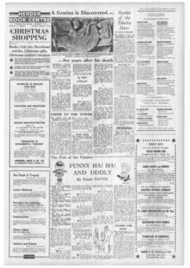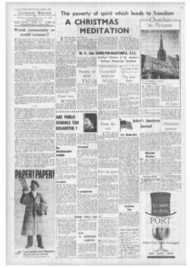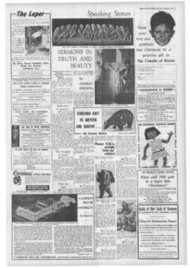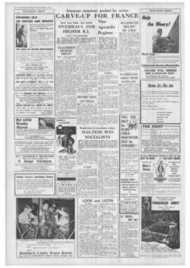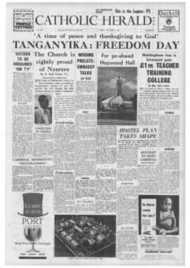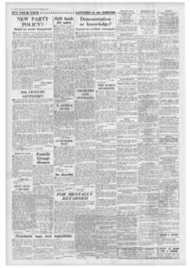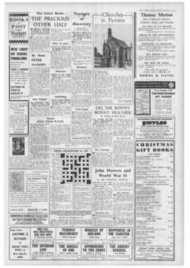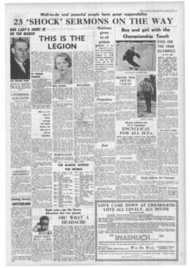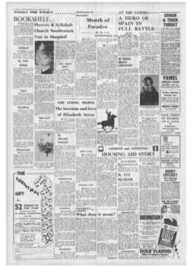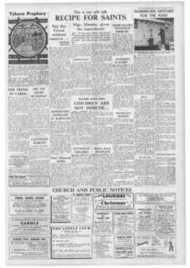Page 11, 1st December 1961
Page 11

Report an error
Noticed an error on this page?If you've noticed an error in this article please click here to report it.
Tags
Share
Related articles
Which Parts Of The Gospel Can We Change If Any?
The Catholic Novelist Does He Exist?
Sparks Of Simplicity
Alcitin On The Latest Books
Epitomy Of Everything English Reading The Catholic Herald?
TRANSFIGURATION OF THE COMMONPLACE
The World of Muriel Spark
By CHRISTOPHER DERRICK
WHEN you refer to someone as "a Catholic novelist", you may mean, roughly, any of three things. You may mean quite simply that he is a Catholic and writes novels.
Taking the matter a stage further, you may mean that Catholic life and thought provide the novelist, in one way or another, with his material ; and in this sense, you can perhaps stretch a point and include the nonCatholic authors of books like John Inglesant and Helbeck of Bannisdale.
Finally, you may mean that your writer's Christian knowledge and insight are dus so deeply into his bones that they deflect and colour his whole outlook, his approach to matters not ecclesiastical or explicitly religious at all, perhaps making him seem eccentric and remote in the world's eye, but still—perhaps unaccountably and enviably in touch. English Catholics, still bothered a little by the old ghetto complex, tend to have outward-turned and defensive habits of mind; in this matter of the novel, they cherish two very august figures as the unassailable showpieces and spokesmen of a minority, and regard their books (instinctively and subconsciously, of course) as well-sugared polemic tracts. This makes sense, up to a point : you can read Brideshead Revisited, not quite fruitlessly, as an essay on the power of the priesthood, Of The Heart of the Matter as a study in the operation of grace. But with this approach you would miss a great deal; and with the novels of Muriel Spark you would miss everything.
Reality
THESE books bothered the critics a good deal. It was obvious, of course. from the appearance of The Comforters in 1951, that Mrs. Spark had an extraordinary gift for diamond accuracy in the handling of language; this, by itself, was enough to make her work a kind of habit-forming drug, an obsession for those with the blind-alley fondness for getting drunk on words. But there was more to The Comforters than that; the ground, or the alleged ground, was already being most scientifically cut from under our feet. Mrs. Spark wrote this book more or less to order, at the suggestion of an unusually intelligent and far-sighted publisher; it was her first and deliberate approach to the possibilities of the novel, and she made of it a vigorous skirmishing over the whole length of the nerve-racking frontier which she has been exploring and exploiting in detail ever since.
Suppose you had a thoroughly modern, thoroughly materialistic person to instruct: where would you start? Surely, by insisting (as a mere preliminary) that "reality" is, or at least may be, something much more complex and perhaps more alarming than is usually dreamt of in common-sensible and scientific ways of thinking.
This could be matter for a philosophical argument: you could point out that science (organised common-sense, sound but limited) works by selecting from the muddled mad torrent of our experience those items which are amenable to a particular kind of sorting-out and classification, Many of us derive great cornfort, though delusory, from the general agreement to live wholly inside the defensive stockade or enclosure thus created, treating as ungentlemanly intrusions whatever sunbursts or howlings may threaten to break through those flimsy defences; and that kind of desire to be cosy and safe, understanding things and in command of them, carefully blind to whatever can't be understood or commanded, could profitably be your first target for destruction in the right sort of apologetic or evangelistic campaign.
Mystery
MRS. SPARK was there ahead of you, unsettling people; and to feel unsettled is the beginning of wisdom. They didn't always like it : they wanted clearcut answers. The odd half-horned character who went ploughing up the suburb in The Rolled of Peckham Rye: was he really a devil, or just an eccentric young matt? Who exactly was it at the other end of the warning telephone-line in Memento Mori?
Are we really, in this day and age, to re-write our psychopathology in terms of diabolical possession, as The Bachelors suggests? Tell us, Mrs. Spark; our brows arc furrowed with uncertainty until we find out.
We never shall find out, of course; any more than we shall plumb the mystery of derivative being itself, the relation between the creating mind and the thing it devises, the kind of stage upon which the dramatist can appear in person, acting the part of himself as actor and carrying the whole play, theatre and all, in his own nailed hand. The Comforters certainly went too far and tried too much; it was a difficult first lesson in the art of living with a permanently furrowed brow. This art ought to come easily to Catholics, since the whole theory of mystery is there in the textbooks, heavily insisted on; but in practice we tend to treat mystery not as the general texture of creaturely experience but rather as a kind of unfair exception or lamentable blind spot within a generally sorted-out or black-and-white system.
Commonplace
DART of the trouble is that the word "mystery", by its mere sound, suggests mistiness, something vague and confused. This is a pity. The theological mysteries, though we cannot understand them, are capable of very precise statement and definition; and at a lower level, it is the common experience that any imaginative exploration of the frontiers of existence depends for its whole effect on the concrete and the particular. The most unnerving ghost stories, such as those of M. R. James, illustrate this perfectly; and so does the technique of surrealistic painters, who needed to summon up common things with the utmost factual precision before they could unsettle us by rearranging them. Mrs. Spark's world is not a fey lunatic world in which anything can happen; her first gift, occasionally used on its own, is for fact, for the shapes of talk, for social realism. and even without her own metaphysical twist she would still have been a painfully exact and deeply moral practitioner of the comedy of manners. She starts, then, with the commonplace, very wittily observed in close detail: and this holds our attention while the great transfiguration or booby-trap is prepared and primed. It never works grossly, with a loud noise; it is a matter of nuance, ambiguity and non-sequitur; you become uneasily aware, perhaps with a sudden freezing of the blood, that things arc not quite what you thought, that the solid
Concluded on page 8, col. 3
blog comments powered by Disqus






